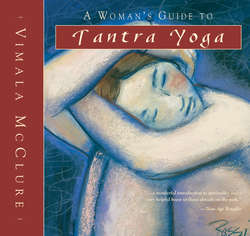Читать книгу A Woman's Guide to Tantra Yoga - Vimala McClure - Страница 15
На сайте Литреса книга снята с продажи.
DISCRIMINATION AND NONATTACHMENT
ОглавлениеYou might think that to such a person, discrimination and nonattachment would be negative concepts. But understood properly these two functions of the higher mind are integral to the positive approach of Tantra Yoga.
Discrimination is knowing what is lasting and what is not, being able to perceive the eternal consciousness within the passing show of the material world, and knowing that attachment to finite objects ultimately can only bring pain and suffering. In this age, it is increasingly easy for us to remain aloof from suffering and death. Because we are not faced with it every day, we become oblivious to our connection with it. We fail to realize that one day we too must die — we too must suffer the pain of loss. The impersonal way in which we are exposed to pain and death, via movies and television, only serves to further separate us from its reality and to desensitize us to the suffering of others.
When faced with the shock of loss, we long for some kind of eternal base for our lives — for the knowledge that will enable us to understand these events and thus cope with our fear and loneliness. Many people turn to religion, but turn away again after their crisis has passed and their mental stability has been restored. This is because often religion can offer only a temporary solace that is no real base in itself. Religions that require faith that is not firmly rooted in personal experience or knowledge, that do not give specific practices by which that knowledge is acquired, often fail to offer the continuing growth and the real answers that the rational individual seeks.
Meditation is a practical connecting link to the eternal base. Rather than acting as a crutch in times of distress, it is a tool with which you can find real answers from within. The realization achieved through meditation is not faith or belief, but knowledge, and as scientists, psychologists, and philosophers have shown us, fear and all of its accompanying anxiety can only be banished by knowledge. The realization attained through meditation enlightens religious beliefs, enabling you to understand the deeper meaning of your chosen religious teachings and apply them to your life.
When that connecting link is established through meditation and you gain some personal experience of your goal, you will begin to gain a sense of discrimination— the ability to place finite events and objects in their proper perspective with the infinite from which they have all evolved.
As it reveals the subtler aspects of your mind, meditation brings you to this fine sense of discrimination, which in turn leads to nonattachment. According to some philosophies, nonattachment means avoidance of the things of the world. Thus some spiritual seekers have mortified themselves to renounce the pleasure and pain of the body; have tried to create aversions in their minds to the natural instincts of eating, sleeping, and sexuality; and have escaped from society to live in jungles or caves far from the “temptations” of worldly life.
Volumes of psychiatric research have shown us that repression is never successful. Such methods of dealing with attachment merely create more obstacles for the practitioner, because they require the mind to be absorbed in negative thoughts rather than in truth. If you adopt such measures you will ultimately turn away from your goal; repression forces your mind to be more deeply entrenched in those things from which you are trying to escape. Although solitude may remove you from the immediate agitations of the world, it does not remove those agitations from the mind, which is their source.
Meditation can reveal truth and calm the agitations of the mind, and it can be practiced anywhere. True detachment is never a negative approach; rather it is a positive attitude of love for the goal, seeing universal consciousness in all forms, and attaching the mind to that infinite essence rather than the finite form in which it appears.
Negative interpretations of discrimination and nonattachment developed through the ages as a result of priest-classes controlling spiritual practice and knowledge. It was expedient for them to retain their power and prestige by preventing ordinary family people from practicing meditation, especially women, who historically have been most “attached” because of their guardianship of home and children. Even today many people avoid meditation because they associate it with solitary asceticism and detachment.
Discrimination also means understanding that pleasure is not the goal of our existence. You can, rather, identify with the broader context within which both pleasure and pain exist as polar expressions. Your attitude is one of dynamic simplicity. You strive without ambition, neither avoiding pain nor seeking pleasure but accepting yourself as you are, letting the process of meditation unfold all of your potentialities naturally within you. Meditation helps you to live your life in balance, and a balanced mind gains deeper realization in meditation.
